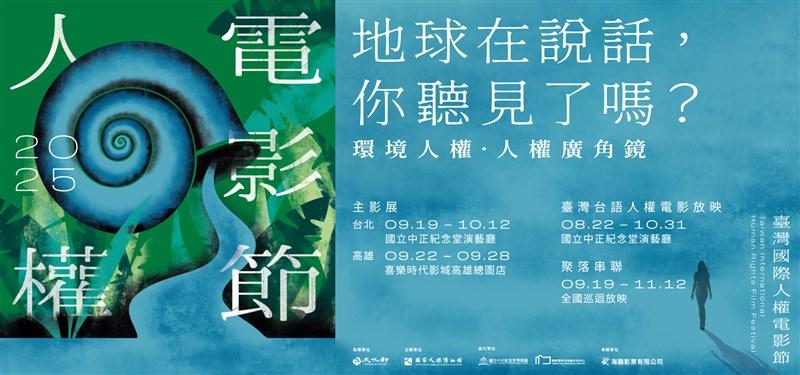This year's Taiwan International Human Rights Film Festival is to center on the themes of human rights, environmental rights and Hokkien (commonly known as Taiwanese), according to the Ministry of Culture (MOC).
Hosted by the National Human Rights Museum and overseen by the MOC, the festival will be held from Sept. 19 to Oct. 12 at the Chiang Kai-shek Memorial Hall Auditorium and from Sept. 22 to Sept. 28 at the Century Asia movie theaters' Kaohsiung Public Library Branch.

Photo: Screengrab of the Taiwan International Human Rights Film Festival’s website
"Highlighting environmental changes caused by human activities, the festival will introduce the Environmental Rights section for the first time, alongside the Human Rights Lens section, the MOC said on its English-language website Global Outreach.
It would invite "audiences to explore diverse dimensions of human rights through the lens of environmental justice," the MOC said.
According to the MOC, the films selected for the Environmental Rights section include "The Blue Trail," "The Incredible Snow Woman," "Only on Earth," "The Rover" and "Flow," which examine environmental changes through the Amazon rainforest, Greenland's icy landscape and Taiwan's mountain peaks.
Meanwhile, the Human Rights Lens section is to showcase nine documentaries and feature films addressing political violence, social suppression, history and resistance, the MOC said.
The lineup includes "Meeting with Pol Pot," "Invisible Nation," "Timestamp," "Black Box Diaries," "The Accidental Politician," "I'm Still Here," "An Unfinished Film," "The Swallows of Kabul" and "Sima's Song," it said.
The Hokkien movie showcase is to be held as a peripheral in Taipei only, running from tomorrow to Oct. 31 at the Chiang Kai-shek Memorial Hall Auditorium, and is to feature 18 films.
Selected works for the section that have been announced include "Super Citizen Ko" (超級大國民) by director Wan Jen (萬仁), and "Strawman" (稻草人) and "Hill of No Return" (無言的山丘) by director Wang Toon (王童).
"A Drifting Life" (春花夢露) by director Lin Cheng-sheng (林正勝), "Jhugeshiro: The Demon Society" (諸葛四郎大戰魔鬼黨), adapted from the works of comic book artist Yeh Hong-chia (葉宏甲), and Sacred Forest (聖殿) by director Ke Chin-yuan (柯金源) is to also be shown.
In a statement yesterday, the MOC invited people to attend the screenings to both learn Hokkien and learn about Taiwan's democratization and human rights development since 1959.

The Taipei Times last week reported that the rising share of seniors in the population is reshaping the nation’s housing markets. According to data from the Ministry of the Interior, about 850,000 residences were occupied by elderly people in the first quarter, including 655,000 that housed only one resident. H&B Realty chief researcher Jessica Hsu (徐佳馨), quoted in the article, said that there is rising demand for elderly-friendly housing, including units with elevators, barrier-free layouts and proximity to healthcare services. Hsu and others cited in the article highlighted the changing family residential dynamics, as children no longer live with parents,

The classic warmth of a good old-fashioned izakaya beckons you in, all cozy nooks and dark wood finishes, as tables order a third round and waiters sling tapas-sized bites and assorted — sometimes unidentifiable — skewered meats. But there’s a romantic hush about this Ximending (西門町) hotspot, with cocktails savored, plating elegant and never rushed and daters and diners lit by candlelight and chandelier. Each chair is mismatched and the assorted tables appear to be the fanciest picks from a nearby flea market. A naked sewing mannequin stands in a dimly lit corner, adorned with antique mirrors and draped foliage

The election of Cheng Li-wun (鄭麗文) as chair of the Chinese Nationalist Party (KMT) marked a triumphant return of pride in the “Chinese” in the party name. Cheng wants Taiwanese to be proud to call themselves Chinese again. The unambiguous winner was a return to the KMT ideology that formed in the early 2000s under then chairman Lien Chan (連戰) and president Ma Ying-jeou (馬英九) put into practice as far as he could, until ultimately thwarted by hundreds of thousands of protestors thronging the streets in what became known as the Sunflower movement in 2014. Cheng is an unambiguous Chinese ethnonationalist,

I was 10 when I read an article in the local paper about the Air Guitar World Championships, which take place every year in my home town of Oulu, Finland. My parents had helped out at the very first contest back in 1996 — my mum gave out fliers, my dad sorted the music. Since then, national championships have been held all across the world, with the winners assembling in Oulu every summer. At the time, I asked my parents if I could compete. At first they were hesitant; the event was in a bar, and there would be a lot